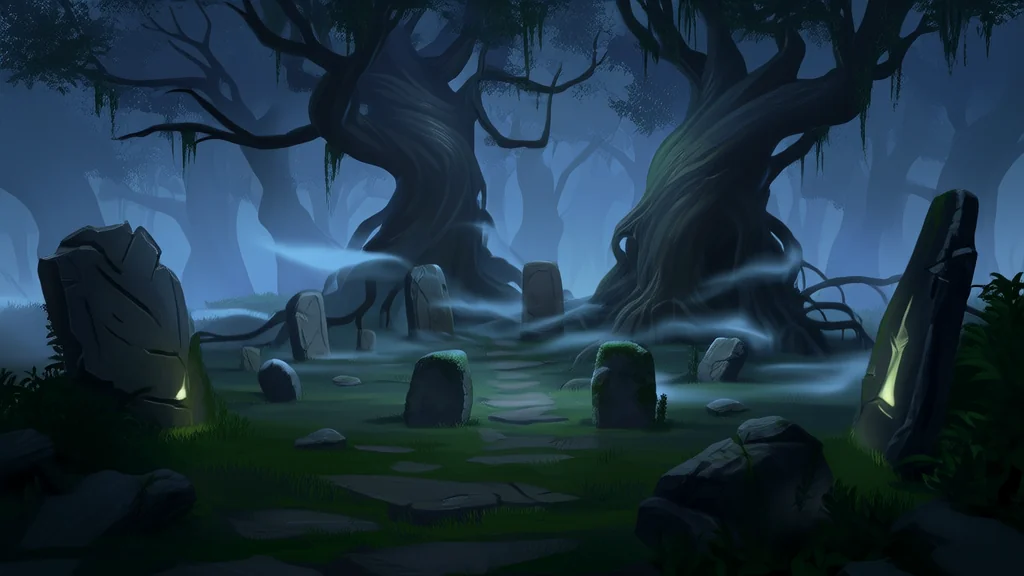🔮 Weird Tales & Urban Legends
The Whispering Hollow: Where Time Bends and Secrets Remain Unspoken

In the quiet town of Eldergrove, nestled between two forgotten hills, there was a place known only as the Hollow. It wasn’t marked on any map, and few dared to speak of it aloud. The locals whispered about it in hushed tones, always careful not to mention it within earshot of the old man who lived at the edge of the woods.
The Hollow was said to be a clearing where time bent and reality wavered. Some claimed that if you stood in its center at midnight, you could hear voices from other times. Others believed it was a gateway to something unseen, a place where the veil between worlds was thin. No one knew for sure, but the stories persisted, passed down through generations like warnings carved into stone.
One summer evening, a young woman named Lila arrived in Eldergrove. She was an archivist from the city, researching local folklore for a book. She had heard the tales of the Hollow and, despite the warnings, felt drawn to it. Her curiosity was sharp, her mind restless. She packed her notebook, a flashlight, and a small notebook filled with sketches of strange symbols she had found in old journals.
She found the path to the Hollow just before dusk. It was overgrown, the trees leaning inward as if trying to block the way. The air grew colder as she walked, and the usual sounds of the forest—crickets, birds, rustling leaves—faded into silence. When she finally reached the clearing, the sky above seemed darker than it should have been, as though the sun had never truly set.
The ground was soft, covered in moss that glowed faintly under the moonlight. In the center stood a circle of stones, each carved with markings that looked ancient yet unfamiliar. Lila knelt and traced her fingers over them, feeling a strange warmth beneath her touch. A breeze stirred the leaves, but no wind had moved the branches. She stood, heart pounding, and noticed something odd: the shadows around her were not cast by the trees, but by shapes that didn’t belong.
She turned slowly, scanning the edges of the clearing. For a moment, she thought she saw figures moving just beyond the tree line—humanoid, but too still, too silent. She took a step back, then another. The moment her foot touched the edge of the circle, the air shifted. The temperature dropped, and the silence deepened into something heavier, almost tangible.
Lila’s flashlight flickered, then died. She fumbled for a backup, but the batteries were dead. Panic crept in, but she forced herself to stay calm. She remembered reading about the Hollow in an old journal—a warning that those who entered without purpose would never leave unchanged.
As she backed toward the path, the trees seemed to close in, their branches twisting unnaturally. The symbols on the stones began to glow faintly, casting eerie patterns on the ground. Lila stumbled, her breath coming fast. Then, just as she reached the edge of the clearing, she heard a voice—soft, almost melodic, speaking in a language she didn’t recognize.
It wasn’t a whisper. It was a song.
She froze. The voice was not coming from the trees, nor from the air. It was inside her head, or perhaps outside, but she couldn’t tell. The words felt familiar, as if she had heard them before in a dream she couldn’t remember. The glow from the stones intensified, and for a brief second, she saw something—images, fragments of lives she had never lived, places she had never seen.
Then everything went black.
When she awoke, she was lying on the forest floor, the first light of dawn creeping through the trees. The clearing was gone. There was no sign of the stones, no trace of the path. Only the trees remained, as if they had always been there.
Lila returned to the town, shaken but determined. She wrote everything down, every detail, every feeling. But when she tried to publish her findings, no one believed her. The townspeople avoided her, and the library where she had researched the Hollow suddenly had no records of it. Even the books she had copied from disappeared from the shelves.
She began to wonder if the Hollow had taken something from her—something she couldn’t name. And as the days passed, she found herself waking up with memories that weren’t hers, dreams of places she had never visited, and a growing sense that she was being watched, even when alone.
Some say that the Hollow is not a place, but a presence. That it waits, patient and unseen, for those who are ready to listen. And some say that the ones who enter never truly return. Not in body, at least.
Published on en
🔗
Related Sites
- AI Blog — AI trends and tech news